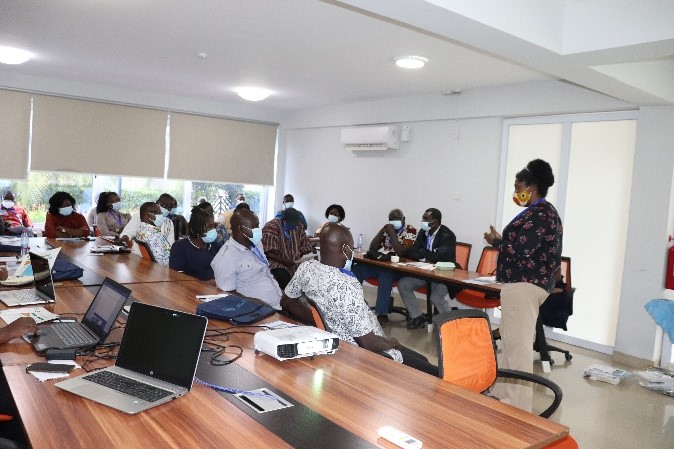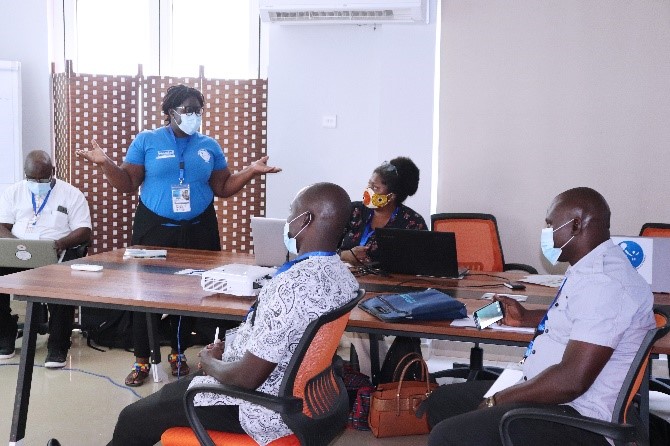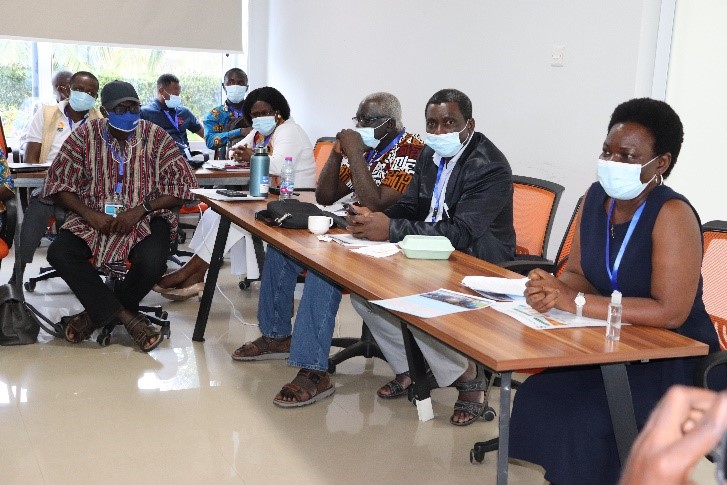IRC Ghana in collaboration with the Coalition of NGOs in Water and Sanitation (CONIWAS) and Hope for Future Generations (HFFG) hosted side event on social inclusion.
Published on: 28/12/2020
At the 31st edition of the Mole Water, Sanitation and Hygiene (WASH) conference on November 4, 2020 in Teiman, Ghana, an event was held on the theme ‘Leave no one behind - Social inclusion for sustainable WASH service delivery’.

Setting the scene for the one-and-half hour side session, Veronica Ayi-Bonte, IRC Ghana Programme Manager welcomed participants to the side event and gave a brief overview of theme and purpose. She pointed out that with about 10 years to the 2030 agenda, the convening team identified social inclusion as one of the critical areas where sector partners need to make intentional efforts and address WASH-related issues. She outlined the objectives of the session - to collectively engage in understanding the marginalisation framework, and how to design and implement social inclusion programmes.
A short presentation on social inclusion was facilitated by Ms. Ayi-Bonte with Ms. Mercy Amokwandoh of Hope for Future Generations sharing case studies from Tarkwa Nsuaem District of the Western Region to deepen the understanding of the issues around inclusion in practice. Inclusion was defined as ensuring that all are able to participate fully, regardless of their differences in ethnic background, financial status, educational level, physical or mental ability, religious and faith-based beliefs, gender, marital status, geographical location, sexual orientation, age, and other socio-economic circumstances.

The presentation also addressed who is marginalised or excluded and underlying factors. Marginalisation was viewed from different levels and factors that contribute to an individual’s vulnerability or exclusion. The micro-level factors include gender, age, disability, and health status; whilst the macro-level included geography, urban, rural; ethnicity, language, religion, tribe, political party, sexual orientation; migration, refugee status; and economic situation, and land ownership.
The information materials used in helping to understand the basic concepts included the participation ladder, substantial equality versus inclusion slide, and the marginalisation framework. By the end, it became clear as stated in the presentation, "Inclusion is not just about improving access to services for those who are currently excluded but also empowering people to engage in wider processes of decision making to ensure that their rights and needs are recognised."
After the presentation, a facilitated expert panel discussion took place in which the heads of IRC Ghana, Vida Duti, SkyFox, Patrick Apoya and Afram Plains Development Organisation, Awudu Modoc participated. They provided more practical insights into what constitutes social inclusion in WASH, who is excluded and what needs to be done for the identified excluded groups, what are the barriers and what are the roles of the different groups. The recommendation from the interactive session was that sector programming should be designed to eliminate the barriers to social inclusion and equity to ensure that no one is left behind.

In his closing remarks, Martin Dery of CONIWAS pledged the commitment of the coalition to uphold issues of inclusion in their programming, and to advocate for the elimination of barriers to social inclusion.
Over fifty (50) stakeholders drawn from civil society organisations (CSOs), local and national government institutions, private sector, research institutions, and the media were at the side event. Overall, the side session was very interactive and was considered by most participants as educative and very informative.
The 31st edition of the Mole Conference was opened on November 3, 2020 by the Minister for Sanitation and Water Resources, Hon. Cecilia Abena Dapaah in Abokobi-Teiman in the Greater Accra Region with the launch of the 'National Solid Waste Management Strategy for Ghana' and a call for closer public-CSO partnership. She also opened the conference exhibition side event with the support of the traditional authorities.
The four-day event had four sub-themes under the main conference theme, 'Prioritising and refocusing sustainable WASH services delivery: Lessons from the COVID-19 pandemic.' The sub-themes were:
IRC Ghana Country Director, Vida Duti presented the conference sub-theme address on Governance and Institutional Development, which was followed by an expert panel discussion. In her address, Vida Duti demonstrated how COVID-19 has exposed the WASH sector, the complexities in the rural water supply sub-sector, and the opportunities for prioritisation. She stated at the end, “The COVID-19 crisis must be a game changer on how we have viewed, valued, prioritised and managed the delivery of WASH services. If this is achieved, one day we will look back and reflect on a robust WASH system driving the delivery of safe water, sanitation, and hygiene services for everyone in Ghana as one of the COVID-19 legacies.”
The conference ended with a conference communique, which was shared with participants.
More information on the 2020 WASH conference and the Mole series is available on the conference page.